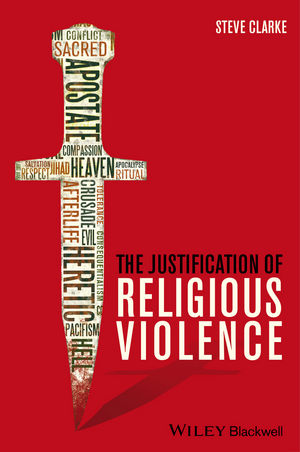 The
religiously violent often justify their worldly violence as part of a larger
'cosmic war' against Satan or another aggressive supreme evil being, says a
Charles Sturt University (CSU) academic.
The
religiously violent often justify their worldly violence as part of a larger
'cosmic war' against Satan or another aggressive supreme evil being, says a
Charles Sturt University (CSU) academic.
Dr Steve Clarke, a senior research fellow at the CSU Centre for Applied Philosophy and Public Ethics (CAPPE) in Canberra, argues this justification closely mirrors the appeal to self-defence in secular 'just' war theory. His observations are detailed in his 2014 book, The Justification of Religious Violence, which draws on findings from psychology, cognitive science, neuroscience, and evolutionary biology.
"Religious violence is all over the media these days," Dr Clarke said. "But what is hard to understand is that members of the Islamic State in Iraq and Syria (ISIS), Boko Haram in Africa, and Al Qaeda, seem convinced that it is morally permissible for them to kill in the name of religion.
"Even Pope Francis seems convinced that it is sometimes acceptable to punch people," he said, referring to recent comments by the leader of the Catholic Church following attacks by Islamic extremists in France.
"Two common responses to the religiously violent are to dismiss them as either ignorant of religious doctrine, or mentally unstable. Neither response does much to help us understand how to reduce religious violence. A third response, which is also unhelpful, is to advocate enthusiastically on behalf of the value of tolerance. The religiously violent have already decided that there is some behaviour that they will not tolerate under any circumstances, and this is what drives them to violent action."
Dr Clarke takes another approach, which is to look carefully at the stated reasoning of the religiously violent. He identifies common themes that emerge in different religious traditions and shows how closely many religious justifications for violence mirror rigorous secular justifications for violence, provided that the worldviews underpinning the religious justifications are taken seriously.
"It might surprise many to know that Osama bin Laden had a well worked-out set of justifications for killing in the name of Islam, which I discuss in my book," he said. "I also examine the reasoning of Christian bombers of abortion clinics, Jewish extremists, and members of the Aum Shinrikyo, a religious group who appealed to Buddhist doctrines to justify the 1995 sarin gas attack on the Tokyo subway, which killed 12 people and injured over 1 000 others."
He says another theme is a consequentialist one, which is that violent action can be justified if it leads to good outcomes, all things considered.
"The religiously violent usually believe that they act in ways that produce the overall best consequences," Dr Clarke said. "However, they understand those consequences more broadly than the secular do.
"Crucially, the religiously violent are often concerned about the afterlife. They want to ensure that people live in ways that will produce better outcomes for them in the afterlife."
Dr Clarke has examined ways to override or undermine arguments for violence that appeal to religion, but this depends very much on the details of the particular arguments in question.
"We may be able to persuade many of the religiously violent to cease acting violently if we listen carefully to what they say and take this as our starting point," he said.
"One important point is this; because many of the religiously violent see themselves as participating in a cosmic war that takes place between a supreme good being and a supreme evil being that takes place over many thousands of years, it may not be crucial to them to act now. Even if we cannot persuade them to abandon their commitment to the cause, we may be able to persuade them that it is in the interest of their cause that they defer violent acts by many decades or even many generations."
Regarding blasphemy and the recent attack in Paris on the French satirical newspaper Charlie Hebdo, Dr Clarke notes that the vast majority of religions understand particular places, people, rituals and relics to be sacred or holy.
"If you disrespect what is sacred to the devout you will cause them to become outraged," he said. "The devout in many religious traditions do not tolerate disrespect of their sacred values. A feature of ordinary human reasoning about sacred values is that it is highly resistant to compromise. If you dare to suggest that the devout might be willing to allow disrespect to their sacred values in return for some other material benefit you are liable to further enrage them because you are implicitly suggesting that they do not really treat what their religion regards as sacred with the respect it is due."
"Compromise over sacred values can sometimes be possible, but it is a delicate matter to actually reach such compromises."





Social
Explore the world of social